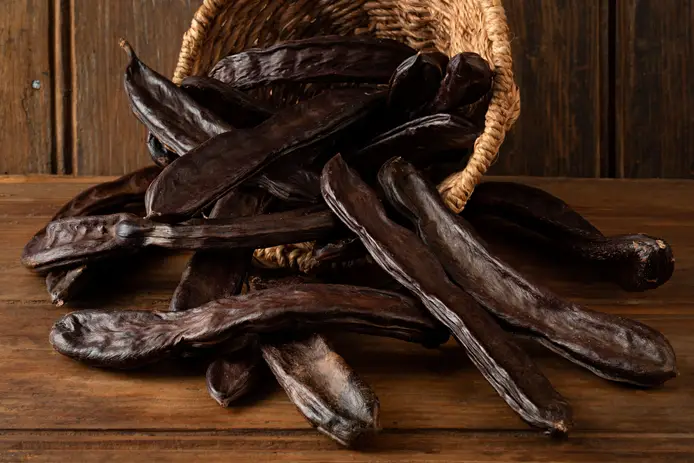I remember the first time I tried carob. Its rich, almost chocolate-like flavor surprised me, and I couldn’t believe it wasn’t some trendy new superfood but actually something that had been enjoyed for centuries. What really drew me in, though, was learning about carob’s high calcium content and how it supports bone health. For women over 50, like myself and many I know, bone health is a priority. As we age, especially for women, our bones become more vulnerable to osteoporosis and fractures. It’s a reality that I’ve seen firsthand—my aunt, a spry woman in her 70s, recently fractured her wrist doing something as simple as carrying groceries. It was a wake-up call, reminding me how essential it is to be proactive about strengthening our bones.
This is where carob can make a difference. Rich in calcium, magnesium, and other minerals, carob provides a nutrient-packed way to support bone density, which is crucial as we age. Unlike chocolate, carob is caffeine-free and naturally lower in fat, making it a gentler and healthier choice for many women, especially those sensitive to caffeine. I’ve found that adding carob to my diet is not only easy but a genuinely enjoyable way to boost my daily nutrient intake. In this article, I’ll share why carob is such a powerhouse for bone health, how it can help women over 50, and simple, delicious ways to include it in everyday meals.

How Carob Supports Bone Health for Women Over 50
High Calcium Content for Strong Bones
Calcium and Bone Density in Aging Women
For women over 50, maintaining calcium levels is essential for bone health. As we age, our bones naturally lose density due to hormonal changes, particularly the drop in estrogen that comes with menopause. Calcium acts as a building block for bone tissue, and without sufficient calcium intake, bones can become brittle and fragile—a key risk factor for osteoporosis. I’ve noticed a lot of women around me, myself included, are wary of relying too much on supplements. That’s one of the reasons I love carob; it’s a natural, whole-food source of calcium that’s easy to integrate into meals.
How Carob Compares to Other Calcium Sources
Many calcium-rich foods, like dairy, aren’t always suitable for everyone, especially as lactose intolerance tends to increase with age. Carob offers an alternative. With about 300 mg of calcium per 100 grams, carob compares well with other plant-based sources. Adding just a tablespoon of carob powder to your daily diet can support your bone health without causing digestive discomfort that some dairy products might. Personally, I like adding a bit of carob powder to my morning smoothie—it blends beautifully with fruits and gives a smooth, slightly nutty flavor.
Magnesium in Carob: The Unsung Hero of Bone Health
Why Magnesium Matters for Bones
Many people don’t realize that calcium alone isn’t enough for strong bones. Magnesium is essential for calcium absorption and helps the body use calcium effectively. Without adequate magnesium, calcium can’t fully contribute to bone density. Women over 50 often have magnesium deficiencies due to changes in diet and metabolism, which can hinder their bone health.
Carob as a Magnesium Source
Carob contains notable amounts of magnesium, complementing its high calcium levels. This combination makes carob unique as it naturally balances both essential minerals in a way that’s easy for the body to absorb. Adding carob to your meals can provide a synergistic effect for bone health, enhancing calcium’s benefits. I’ve found that magnesium-rich foods like carob don’t just support my bones—they also help me sleep better, as magnesium is known for promoting relaxation.
Antioxidants and Phytochemicals: Carob’s Extra Benefits for Aging Bones
Protecting Bones from Oxidative Stress
Aging bones are more susceptible to oxidative stress, a process where free radicals damage bone cells and contribute to bone loss. Antioxidants are crucial because they neutralize these free radicals, protecting bone cells from degeneration. Carob is rich in antioxidants, including polyphenols, which have been shown to have anti-inflammatory properties. This makes carob an excellent choice for women over 50 who want to take a proactive approach to bone health.
A Natural, Low-Caffeine Alternative to Chocolate
While chocolate also contains antioxidants, it’s often high in sugar and caffeine. Caffeine can interfere with calcium absorption, which is something to keep in mind if you’re focused on bone health. Since carob is caffeine-free, it doesn’t hinder calcium intake the way chocolate might. This is why I often use carob powder in recipes where I’d normally add cocoa powder—it’s a small swap that makes a big difference over time.
How to Add Carob to Your Daily Diet for Bone Health
1. Morning Smoothies
Adding a tablespoon of carob powder to your morning smoothie is an easy way to start your day with a calcium boost. I love pairing carob with banana and almond milk—it tastes like a mild chocolate-banana smoothie but without the caffeine. You could also add a handful of spinach or kale for an extra nutrient kick. This makes a powerful, bone-strengthening breakfast that’s also delicious.
2. Baking with Carob Powder
Carob powder can be substituted for cocoa powder in most baking recipes. It’s naturally sweeter than cocoa, so you might even be able to reduce the amount of sugar in your recipes. From brownies to muffins, carob’s mild, chocolate-like flavor makes it versatile. I’ve made carob brownies that were a huge hit with my family—they didn’t even notice the switch!
3. Carob Bars as a Snack
For a convenient, on-the-go option, try carob bars. Many health food stores carry these, or you can make your own at home by mixing carob powder with oats, honey, and nuts. These bars provide a balanced snack that’s high in calcium, magnesium, and other bone-friendly nutrients. I always keep one in my bag for when I’m running errands or need a quick energy boost.
4. Carob Tea for an Evening Boost
Carob tea is an enjoyable way to wind down your day while supporting your bones. Made from carob pods, this caffeine-free tea has a mild, earthy flavor that’s relaxing. I sometimes sip on carob tea in the evening, knowing it’s a way to get those extra nutrients without disrupting my sleep. Just boil a few pieces of carob pod in water for 10–15 minutes, and enjoy!
Conclusion
Adding carob to your diet is a delicious, natural way to support bone health, especially for women over 50 who are at a higher risk for osteoporosis. Its unique combination of high calcium and magnesium content, along with antioxidant benefits, makes it a valuable addition to any diet focused on maintaining strong bones and overall health.
In my experience, making small dietary changes, like adding carob, can have a meaningful impact on bone strength and vitality. Whether you’re mixing it into a smoothie or enjoying it as a snack, carob’s benefits go beyond its flavor, making it a thoughtful choice for long-term wellness. It’s never too late to start caring for your bones, and carob is a simple, enjoyable way to do so.








